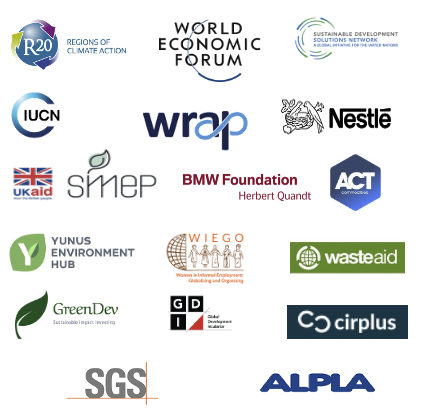The Circular Credits Mechanism™ (CCM) is a system of performance-based payments for environmental services of circularity, striving for inclusiveness and wide social participation. It is a market tool for buyers and sellers of the environmental services related to the collection (recovery), sorting and appropriate destination of recyclable waste materials that today pollute our environment.
Through the use of credits, interested parties (the buyers – e.g., companies) can compensate for their waste footprint, by effectively subcontracting the services provided by sellers (e.g., projects, waste pickers associations, etc.) providing the environmental service of waste recovery and appropriate destination.
In the absence of polluter-pay regulations in some countries (e.g. Extended Producer Responsibility – “EPR” schemes), the tool can positively contribute to social and environmental impacts (e.g., low income groups in developing countries). For countries with existing EPR schemes, the Credits may be recognised as one of the ways of complying with these regulations.
To issue Circular Credits, projects must conform to the Circular Credits Mechanism Standard, and its Principles and Criteria.

AN INCLUSIVE APPROACH TO THE PROJECT CYCLE
Traditional project cycles for environmental markets (e.g., carbon markets) require the validation, registration, independent verification, and issuance of credits before developers can receive any financial return. Transaction costs involved can be significant, and beyond the means of project developers.
The CCM was designed by BVRio, based on its experience with the Reverse Logistics Credit System in Brazil. The objective of the CCM is to be inclusive and accessible to all, especially SMEs and community-based operations.
For this reason, the CCM adopts an inverted project cyclewhere developers can post their offers based on self-declarations that are verified only after projects secure financial support. There are no costs associated with project registration and credit issuance , and all other transaction costs are covered by the buyers of environmental services.
Circular Credits are transacted exclusively through the Circular Action Hub’s marketplace, which also acts as its Registry.

Governance and Oversight
Recognising that there is a huge diversity of circumstances, technologies, and approaches that can be used by projects in different parts of the world, the Hub adopts a ‘learning-by-doing’ approach and strives for continuous improvement of its requirements based on the experience learned with participating projects. To guide this learning process, an Advisory Group and a Technical Advisory Committee were created with representation from both the ‘buy-side’ (corporates, donors, investors) as well as technical, scientific, and social sector organisations interested in the social and environmental quality of the initiatives promoted.
